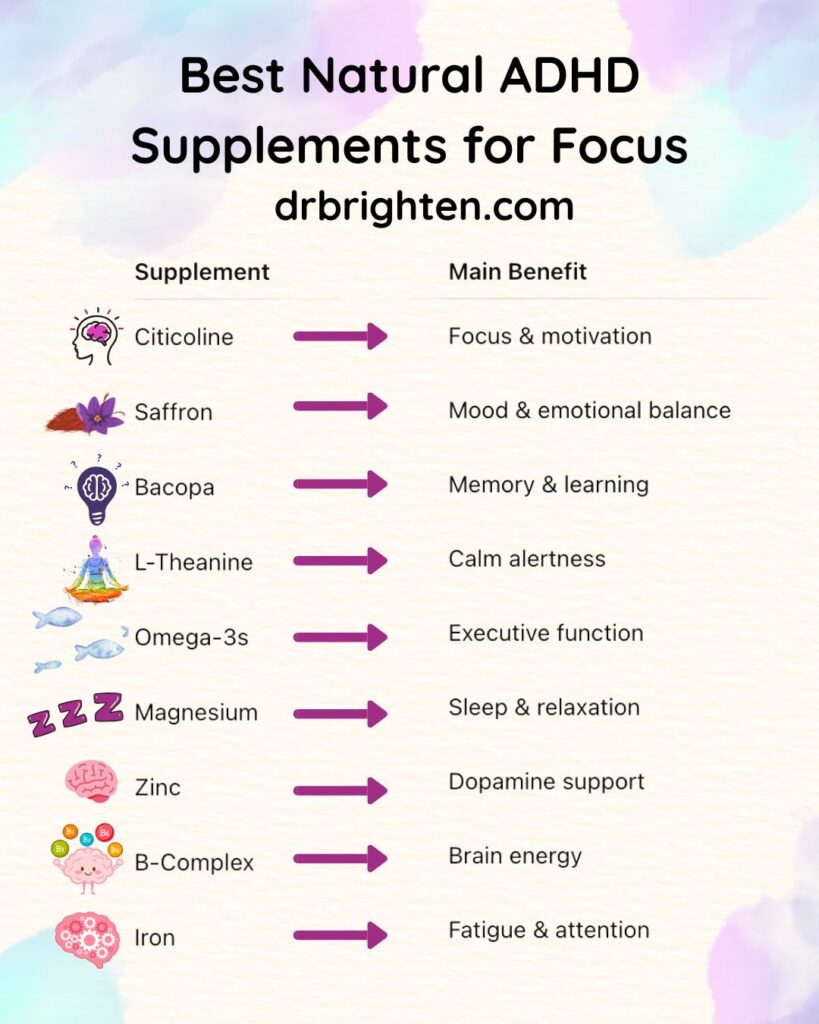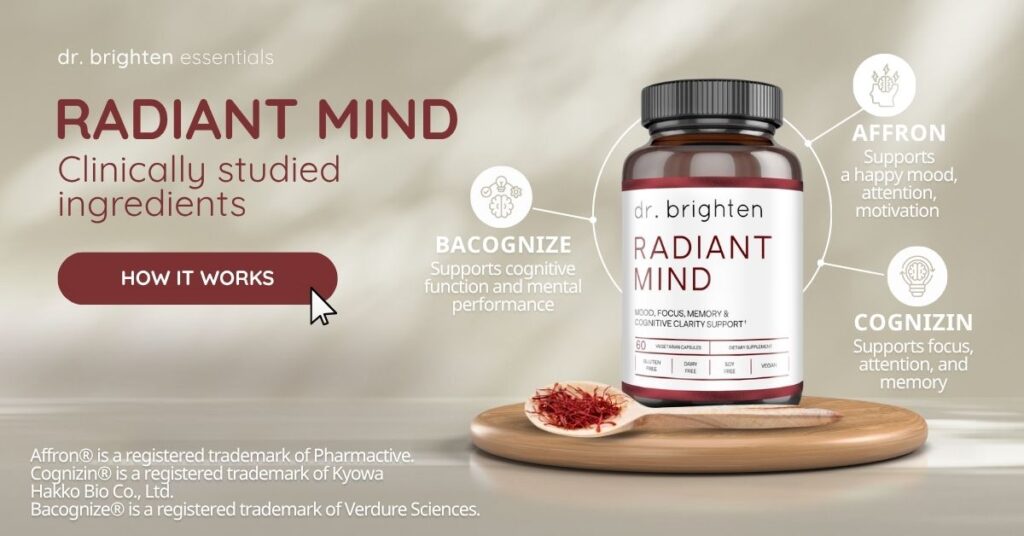If you’re searching for natural ADHD supplements that support focus and attention without stimulants, this guide breaks down what’s clinically backed and what to skip.
You might feel less alone knowing that millions of adults in the U.S. face similar challenges—including racing thoughts, forgetfulness, and mental fatigue, which can make it hard to stay productive and emotionally balanced when managing ADHD.
While prescription medications are effective for many, they’re not the only option. And a growing number of adults, including many women with ADHD, prefer to turn to natural support, like adaptogenic herbs and brain-boosting nutrients, to help sharpen their attention, improve working memory, and promote calm focus.
Let’s explore which over-the-counter supplements can actually make a difference for those with ADHD.
In this article:
- Quick Answer: Top ADHD Supplements That Support Focus, Mood, and Memory
- How ADHD Affects Focus, Motivation, and the Brain’s Attention Network
- ADHD Focus Supplements: Dose & Timing Table
- The Most Researched Natural Supplements for ADHD Focus and Working Memory
- Other Nutrients and Botanicals Worth Considering for ADHD Focus and Motivation
- Single vs. Multi-Ingredient ADHD Formulas: Which Supplement Stack Is Right for You?
- Safety, Interactions & Who Should Avoid Certain ADHD Supplements
- FAQs: Best ADHD Supplements for Focus, Memory, and Emotional Balance
Quick Answer: Top ADHD Supplements That Support Focus, Mood, and Memory
As you'll learn more about below, here's a quick rundown of well-studied ADHD focus supplements that support attention, memory, and emotional regulation:
- Citicoline (Cognizin®): 250–500 mg/day can help improve attention and mental energy (it can take days to weeks to see results).
- Saffron (affron®): 28–30 mg/day can support mood, stress, and distractibility within about 4 to 6 weeks.
- Bacopa (Bacognize®): 300 mg/day can help improve working memory and learning within a couple of months.
- L-theanine (± low-dose caffeine): 100–200 mg often promotes calm alertness and has an immediate effect.
- Omega-3s (combined EPA + DHA): About 1,000 mg/day has been shown to support executive function over time.
- Magnesium (glycinate or taurate): 200–400 mg/day helps calm the nervous system and supports restful sleep.
- Zinc: 8–15 mg/day aids in neurotransmitter activity and mood stabilization.
- Vitamin B-Complex: Supports energy metabolism, methylation, and neurotransmitter synthesis.
Radiant Mind combines several of these powerful ingredients—including saffron, citicoline, bacopa, and zinc—into a single, non-sedating formula designed to support daytime clarity and focus.
Related:
Exploring Natural Solutions for Adult ADHD — How To Find Relief
ADHD and Anxiety: How to Tell the Difference and What to Do About It
How ADHD Affects Focus, Motivation, and the Brain’s Attention Network
People with ADHD often experience disruptions in the brain’s “attention network,” primarily located in the prefrontal cortex, the area responsible for planning, focus, and impulse control.
These functions rely on a delicate balance of neurotransmitters like dopamine, acetylcholine, and norepinephrine, which are often dysregulated in ADHD.
For example, low dopamine levels can contribute to poor motivation and difficulty sustaining attention, while imbalances in acetylcholine may impair working memory and information processing.
This is why certain nutrients that support neurotransmitter synthesis and signaling—such as citicoline, magnesium, and zinc—may help promote clearer thinking and better cognitive performance in adults with ADHD.
Other contributing factors to poor focus associated with ADHD include:
- Stress and cortisol imbalances (HPA axis dysregulation)
- Sleep deprivation or irregular circadian rhythms that can interfere with energy, motivation, and concentration, and can increase fatigue
- Blood sugar instability, which can worsen anxiety, brain fog, or irritability
- Micronutrient deficiencies, especially in magnesium, zinc, and B vitamins
For women, hormonal fluctuations, like declining estrogen in perimenopause, can also worsen executive dysfunction and emotional reactivity (learn more about ADHD and hormones here).
For instance, right before a woman gets her period, she might deal with increased irritability, brain fog, or a noticeable drop in focus due to shifting estrogen and progesterone levels. And if she’s in perimenopause, she may struggle with even more pronounced mood swings, sleep disturbances, and “crashing” fatigue that amplify ADHD symptoms and make it harder to stay organized or regulate emotions.
The right supplements for ADHD focus can help support these systems, typically without the side effects that come along with many stimulants.
If you're looking for more help, you can find all the free ADHD Resources for Women that I share here.
Other related articles:
This Is How Your ADHD Can Affect You During Menopause
ADHD and PMDD Hormone Connection
ADHD Focus Supplements: Dose & Timing Table
| Supplement | Typical Daily Dose | Time to Notice Effects | Notes |
| Citicoline (Cognizin®) | 250–500 mg, With or without food (morning preferred) | 3–14 days | May enhance motivation, clarity, and focus; pair with Omega-3s for added cognitive benefit. |
| Saffron (affron®) | 28–30 mg, With food | 2–6 weeks | Supports mood and attention; consistent daily use yields best results. |
| Bacopa (Bacognize®) | 300 mg, With food (evening if drowsy) | 4–8 weeks | Supports memory, learning, and cognitive stamina; can cause mild GI effects. |
| L-Theanine (± Low-Dose Caffeine) | 100–200 mg (with 25–100 mg caffeine optional), With or without food | 30–60 minutes | Promotes calm alertness; may smooth caffeine jitters. |
| Omega-3s (EPA + DHA) | ~1,000 mg combined, With meals (especially with fat) | 4–12 weeks | EPA-dominant blends often best for focus and emotional regulation. |
| Magnesium (Glycinate or Taurate) | 200–400 mg, With meals or before bed | 1–3 weeks | Promotes relaxation, sleep quality, and calm focus; avoid citrate if loose stools occur. |
| Zinc | 8–15 mg, With food | 2–8 weeks | Supports dopamine and neurotransmitter balance; long-term use may require copper. |
| Vitamin B Complex | B6: 10–25 mgB12: 500–1000 mcgFolate (5-MTHF): 400–800 mcg, With food (morning) | 2–4 weeks | Supports brain energy, mood, and methylation; use active B forms for best absorption. |
| Iron (Ferrous Bisglycinate or Ferrous Sulfate) | Dose individualized; often 25–65 mg elemental iron if deficient, With food | 4–12 weeks after correcting low ferritin | Replenishes ferritin and supports dopamine synthesis. Test before use—excess iron may cause GI upset or oxidative stress. |
The Most Researched Natural Supplements for ADHD Focus and Working Memory
1. Citicoline (Cognizin®): Supports Dopamine and Acetylcholine for Attention
Citicoline is a brain nutrient that supports acetylcholine (an attention neurotransmitter) and phospholipid repair, meaning it helps maintain the integrity of brain cell membranes and the signaling needed for clear thinking.
Studies show it can help enhance working memory, mental energy, and executive function by boosting acetylcholine synthesis in the prefrontal cortex, improving communication between neurons, and supporting mitochondrial energy production, processes that help with sustained focus and sharper cognitive performance
In one study1, daily Cognizin® citicoline supplementation improved attention, motor speed, and decreased impulsivity in healthy adult women. In a separate study2, it also boosted attention and decreased impulsivity in young men.
Typical Dose: 250–500 mg/day. It usually takes effect in days to weeks.
Best for: Mental fatigue, scattered focus, brain fog.
Precautions: It's generally well-tolerated, but use caution if taking cholinergic meds.
In summary: Citicoline supports dopamine and acetylcholine signaling in the prefrontal cortex, helping improve motivation, working memory, and sustained attention.
You can find this ingredient in Radiant Mind by Dr. Brighten Essentials, which uses Cognizin to support memory, mental energy, and focus.
2. Saffron Extract (affron®): Mood and Stress Support for ADHD Focus
Saffron is a spice-derived botanical that supports mood, emotional regulation, and stress resilience. It can help balance attention and distractibility, especially in emotionally reactive or overwhelmed states.
Studies show saffron can support mental performance and mood regulation in both teens and adults. In one study3, results showed that Affron® helped adults maintain a positive mood and alleviate occasional stress, frustration, and tension. Another study4 found the same benefits for adolescents, as well as alleviation of anxiety.
It also appears to help reduce symptoms of ADHD by influencing serotonin and dopamine levels in the brain, which can support better impulse control, focus, and motivation, particularly when mood and cognitive clarity are affected by stress.
Typical Dose: 28–30 mg/day of a standardized extract. Effects often appear within 1 to 4 weeks.
Best for: Emotional reactivity, low mood, stress-related distraction.
Precautions: Monitor if taking SSRIs or SNRIs. Avoid high doses in pregnancy.
In summary: Saffron helps balance serotonin and dopamine pathways, reducing emotional reactivity and promoting calmer, more focused attention over time.
You can find this ingredient in Radiant Mind by Dr. Brighten Essentials, which uses affron to support focus, mood, and cognitive clarity.
Related: Anxiety and Supplements: What Really Works for Stress, Mood, and Sleep
3. Bacopa Monnieri (Bacognize®): Memory and Learning Support for Adults with ADHD
Bacopa is a traditional Ayurvedic herb used to support memory, learning, and cognitive processing, including when under stress. Standardized forms like Bacognize® have been clinically studied for their effects on attention and working memory, including among students5 and adults.
In one 6-week study, Bacopa was able to boost cognitive performance6 in medical students when taken in dosages of 150 mg of standardized extract of Bacopa monnieri (Bacognize).
Another study among older adults7 found that Bacopa helped support cognitive function in those with Alzheimer's, including by improving their orientation of time, place, and person, attention in language components, reading, writing, and comprehension.
It works by supporting synaptic communication, modulating serotonin and dopamine pathways, and boosting antioxidant defenses in the brain. These actions can help improve learning, reduce mental fatigue, and improve the speed and accuracy of memory recall.
Typical Dose: About 300 mg/day of a standardized extract. Full effects may take 4 to 8 weeks.
Best for: Mental stamina, learning retention, memory consolidation.
Precautions: It may cause mild GI discomfort or drowsiness in some people. Consider taking in the evening if sedation occurs.
In summary: Bacopa enhances synaptic communication and antioxidant protection in the brain, supporting learning, memory recall, and cognitive stamina.
You can find this ingredient in Radiant Mind by Dr. Brighten Essentials, which uses Bacognize to support attention and mood.
4. L-Theanine (± Low-Dose Caffeine): Calm Focus and Attention Support
L‑theanine is an amino acid found in green tea that promotes calm alertness by increasing alpha brain waves. It also modulates neurotransmitters8 like dopamine and GABA.
Studies show that L-theanine can help reduce anxiety and mental overstimulation while enhancing focus. In one double blind trial9, L-theanine boosted attentional processing of auditory information and had no side effects. It works especially well when paired with a small amount of caffeine, which helps smooth out by reducing jitter and crash.
Typical Dose: 100–200 mg theanine, optionally paired with 25–100 mg caffeine. Effects are typically felt within 30–60 minutes.
Best for: Anxious focus, overstimulation, caffeine sensitivity.
Precautions: Generally well tolerated. Monitor caffeine intake if combining.
In summary: L-theanine increases alpha-wave activity for calm alertness and can smooth caffeine’s stimulating effects to improve focus without jitteriness.
You can find this ingredient in Adrenal Calm evening formula by Dr. Brighten Essentials, which uses L-theanine to support restful, restorative sleep and relaxation.

5. Omega-3 Fatty Acids (EPA + DHA): Brain and Attention Benefits in ADHD
Omega‑3 fatty acids support healthy brain cell membranes, neurotransmitter signaling, and overall cognitive health10 and neuroplasticity. Some research suggests EPA-rich formulas can also improve attention and impulse control11, including in children with ADHD.
These healthy fats, which you must obtain for your diet or supplements, support executive function and emotional regulation by promoting anti-inflammatory signaling and optimal neuronal communication. They're also generally beneficial for heart health, mental well-being, and more.
Typical Dose: About 1,000 mg/day combined EPA and DHA, which you can obtain from Omega Plus. Higher EPA levels may be ideal for attention support. Effects typically take 4–12 weeks.
Best for: Executive function, mood, and focus over time.
Precautions: May increase bleeding risk at high doses. Use caution with anticoagulant meds.
In summary: Omega-3s strengthen neuronal membranes and anti-inflammatory signaling, improving executive function, impulse control, and mood stability.
You can find this ingredient in Omega Plus by Dr. Brighten Essentials, which uses omega-3, 9, and 11 to support brain, and metabolic health.
6. Magnesium (Glycinate or Taurate): Calming Mineral for Focus and Sleep
Magnesium plays a role in over 300 enzyme systems, including those regulating nervous system function, sleep, and stress hormones.
Supplementation may help reduce hyperactivity and anxiety by supporting relaxation, GABA activity, and adrenal health. One meta-analysis12 found that the lower magnesium levels were, the stronger ADHD symptoms appeared to be (indicating an inverse relationship).
Another study13 found that vitamin D and magnesium supplementation in children with ADHD was effective for managing conduct problems, social problems, and anxiety/shyness.
Typical Dose: 200–400 mg/day. Choose glycinate—such as Magnesium Plus—or taurate for better absorption and gentler effects with a lower chance of stomach upset.
Best for: Stress-related distractibility, poor sleep, tension.
Precautions: Some types of magnesium can cause loose stools in some forms (such as magnesium citrate), so adjust form or dose as needed.
In summary: Magnesium calms the nervous system by supporting GABA activity and adrenal balance, easing stress-related distractibility and tension.
You can find this ingredient in Magnesium Plus by Dr. Brighten Essentials, which uses magnesium glycinate to support relaxation, sleep, and stress.
7. Zinc: Dopamine-Supportive Nutrient for Focus and Mood Balance
Zinc is a cofactor in neurotransmitter synthesis, including dopamine and GABA, which are important for sustained attention and mood regulation.
Higher zinc intake can help support brain signaling pathways and has shown some benefits14 in helping both children and adults with ADHD symptoms. One study15 found that both zinc and omega-3 supplementation led to greater clinical improvements in ADHD compared to a placebo.
Typical Dose: 8–15 mg/day. Balance with copper intake for long-term use.
Best for: Dopamine support, neurotransmitter balance.
Precautions: Avoid excess intake or long-term high doses can deplete copper.
In summary: Zinc acts as a cofactor in dopamine and GABA production, stabilizing mood and supporting consistent cognitive performance.
You can find this ingredient in Radiant Mind by Dr. Brighten Essentials, which uses zinc citrate and gluconate to support brain health.
8. Vitamin B Complex: Brain Energy and Methylation Support for ADHD Adults
B vitamins are critical for brain energy, methylation, and neurotransmitter synthesis. B6 is especially important for GABA/dopamine and B12/folate for mood and cognition.
When taken together, B vitamins—such as in my B Active Plus formula—can support mental clarity and reduce fatigue, especially if you have poor absorption, dietary gaps, or elevated homocysteine levels. Higher B intake is also linked to lower prevalence of cognitive impairment16 in adults.
Typical Dose: Varies by form and need (B6: about 10–25 mg/day, B12: 500–1000 mcg/day, and folate: about 400–800 mcg/day as 5‑MTHF).
Best for: Brain energy, methylation support, nutrient gaps.
Precautions: Talk to your doctor first if you take any other medications or have a known MTHFR mutation.
In summary: B-vitamins fuel neurotransmitter synthesis and methylation, sustaining brain energy, focus, and emotional balance in adults with ADHD.
Dr. Brighten Essentials B Active™ provides bioavailable B6, B12, and 5-MTHF to support energy and neurotransmitter balance.
9. Iron: Check Ferritin Levels Before Supplementing for Focus and Energy
Iron plays an essential role in brain function—especially in attention, energy metabolism, and dopamine production. Low ferritin (your body’s stored iron) has been linked to increased ADHD symptom severity, including poor focus, low motivation, and restless sleep.
That’s because iron is a cofactor for the enzyme tyrosine hydroxylase, which converts the amino acid tyrosine into dopamine. Without enough iron, dopamine synthesis slows, leaving you more prone to brain fog and fatigue.
Women are particularly vulnerable to low ferritin during heavy menstrual bleeding, pregnancy, postpartum recovery, and perimenopause. While correcting an iron deficiency can significantly improve energy and attention, unnecessary supplementation can cause oxidative stress, inflammation, and even gut discomfort.
Always test your ferritin, hemoglobin, and iron saturation before supplementing, and aim for ferritin levels in the optimal range (often 50–100 ng/mL).
Best for: Fatigue, low motivation, poor focus related to low ferritin
Precautions: Avoid high-dose iron without lab confirmation; excessive iron can raise oxidative stress and damage tissues.
Pro tip: Pair iron-rich foods—like grass-fed beef, lentils, or spinach—with vitamin C–rich foods (like bell peppers or citrus) to improve absorption
In summary: Iron replenishes ferritin and supports dopamine synthesis, which can reduce fatigue and improve attention when deficiency is present.You can find this ingredient in Prenatal Plus by Dr. Brighten Essentials, which uses iron glycinate to support healthy ferritin levels.

Other Nutrients and Botanicals Worth Considering for ADHD Focus and Motivation
While the nutrients above have the strongest clinical support, several additional compounds show promising evidence for attention, motivation, and emotional regulation—especially when ADHD overlaps with fatigue, stress, or hormonal change.
Vitamin D
Vitamin D receptors are abundant in brain regions tied to attention and mood. Low vitamin D levels are common in adults with ADHD and correlate with lower dopamine activity and higher symptom severity.
Best for: Low energy, poor mood, executive dysfunction.
Typical Dose: 1,000–2,000 IU/day (adjust to achieve blood levels 30–60 ng/mL).
Precautions: Test before supplementing; fat-soluble vitamins can accumulate.
View the vitamin D3/K2 from Dr. Brighten Essentials.
N-Acetyl-Cysteine (NAC)
NAC replenishes glutathione, the brain’s master antioxidant, and may reduce impulsivity, emotional reactivity, and oxidative stress that worsens focus.
Best for: Emotional regulation, overstimulation, stress-related burnout.
Typical Dose: 600–1,200 mg 1–2× daily.
Precautions: May interact with nitroglycerin; start low to minimize mild GI upset.
View our best selling NAC from Dr. Brighten Essentials.
Phosphatidylserine (PS)
A key phospholipid for neuronal membranes, PS supports dopamine receptor function and cortisol balance. Human studies show benefits for attention and working memory.
Best for: Working memory, stress adaptation, and mental stamina.
Typical Dose: 50-100 mg nightly.
Precautions: Derived from soy or sunflower—check for sensitivities.
Phosphatidylserine is part of what makes our Adrenal Calm evening formulation so popular from Dr. Brighten Essentials.
Rhodiola rosea
This adaptogenic herb helps balance cortisol and improve mental endurance during stress. It can sharpen focus without overstimulation.
Best for: Stress-related fatigue, low motivation, burnout.
Typical Dose: 200–400 mg standardized extract (3 % rosavins, 1 % salidroside).
Precautions: May cause jitteriness in very sensitive individuals; avoid near bedtime.
View our energy supporting morning formula, Adrenal Support, from Dr. Brighten Essentials.
L-Tyrosine
A precursor to dopamine and norepinephrine, tyrosine can help sustain focus during periods of sleep deprivation, stress, or stimulant “crash.”
Best for: Motivation dips, cognitive fatigue, low dopamine states.
Typical Dose: 500–2,000 mg taken 30–60 minutes before demanding mental tasks.
Precautions: Avoid combining with L-Dopa medications or high-dose thyroid support.
Phosphatidylserine, NAC, or Vitamin D: When to Prioritize
If your ADHD symptoms worsen with stress, fatigue, or seasonal changes, consider checking vitamin D levels first and layering in NAC or PS for antioxidant and mitochondrial support. These target underlying oxidative stress rather than short-term stimulation—helping you build steady mental energy and resilience over time.

Single vs. Multi-Ingredient ADHD Formulas: Which Supplement Stack Is Right for You?
Single-ingredient supplements offer flexibility, but they can also be inconvenient if you plan to take multiple types each day.
Many prefer multi-ingredient blends, which can provide synergistic effects when combining nutrients that target complementary pathways, such as dopamine + acetylcholine + stress response.
Here's a basic checklist for quality when looking for ADHD supplements:
- Clinically studied ingredients (like affron®, Cognizin®, Bacognize®)
- Third-party tested
- Clear dosing
- Manufactured in cGMP-certified facilities
What Makes Radiant Mind Stand Out:
Radiant Mind is a daytime formula designed to support mental clarity, calm focus, and emotional balance, including in adults with attention challenges or ADHD.
Inside, you'll find:
- affron® saffron: For mood and stress support
- Cognizin® citicoline: For acetylcholine balance + focus
- Bacognize® bacopa: To support memory + learning
- Zinc: For neurotransmitter support and general nervous system/brain health
These ingredients support different layers of cognitive performance, ranging from brain energy and memory to emotional balance and stress recovery.
It's ideal for adults looking for non-sedating, stimulant-free support for working memory, clarity, and sustained attention. Because it's made in the USA in cGMP facilities and third-party tested for purity, you can feel confident that you're taking a top-quality supplement.
Learn more about Radiant Mind here.
Safety, Interactions & Who Should Avoid Certain ADHD Supplements
Even natural supplements can have powerful effects, and they can potentially interfere with how other medications work.
Before diving into these supplements, it’s smart to double-check for any interactions or red flags. If you’re on medications or have specific health conditions, talk with your provider before trying new supplements.
Here's what to keep in mind:
- If you take stimulants (like ADHD meds): Be mindful when adding caffeine or theanine. Timing matters to avoid feeling too wired or too sedated.
- If on antidepressants like SSRIs or SNRIs: Keep an eye out if you’re trying saffron. It's generally safe, but check with your doc just to be sure.
- If taking blood thinners or aspirin: Use extra caution with omega-3s or ginkgo, as they can thin the blood a bit more.
- If you have bipolar disorder, Rhodiola may not be the best fit, since it can potentially trigger mood swings if you’re not supervised.
- If pregnant or nursing: Skip high-dose saffron and always run supplements by your provider.
- If you have a sensitive stomach, Bacopa sometimes causes mild nausea or bloating—try it with food if that’s you.

FAQs: Best ADHD Supplements for Focus, Memory, and Emotional Balance
That really depends on your needs, but can include citicoline for attention, saffron for mood, and bacopa for memory. All of these are great starting points and low-risk options.
Some people feel a difference in a few days, while others may need 2–4 weeks. The same can be said for most other supplements: you might not notice a difference right away and need to be patient for several weeks.
Yes, studies suggest it can support emotional regulation and stress resilience, which can reduce distractibility.
Typically, 4–8 weeks of consistent use for cognitive benefits.
Try saffron + citicoline + bacopa + zinc—like what’s found in Radiant Mind. This is a non-stimulating formula that can be taken during the daytime but won't interfere with your sleep.
Generally, yes, but check with your prescriber first to be safe.
They may help, especially if your diet is low in fatty fish. They're also helpful for other aspects of health, such as heart, skin, and brain health.
L-theanine on its own can help promote calm focus. Citicoline and B vitamins can also help.
Yes, Bacognize® is standardized and studied for cognitive benefits. It's the type I recommend most and the kind found in Radiant Mind.
Saffron, citicoline, and magnesium are often helpful.
Want a simpler routine? Radiant Mind combines clinically studied saffron, citicoline, bacopa, and zinc in one easy capsule. No stimulants. No grogginess, just steady, calm focus.
And for even more natural support if you're struggling with ADHD brain fog, mood swings, or burnout, check out the FREE 5-Day ADHD Woman’s Hormone & Brain Sync Guide to learn how to align your focus, energy, and emotions with your cycle. You’ll get bite-sized, science-backed tips to help you finally feel clearer, calmer, and in control, all without medication or overwhelm. Learn to balance brain fog, boost productivity, sleep better, and feel like you again when you sign up here.
References
- https://cognizin.com/storage/app/media/pdfs/improve-attention-cognizin.pdf ↩︎
- https://pubmed.ncbi.nlm.nih.gov/26179181/ ↩︎
- https://www.sciencedirect.com/science/article/abs/pii/S0965229917300821?via%3Dihub ↩︎
- https://www.sciencedirect.com/science/article/abs/pii/S0165032717327131?via%3Dihub ↩︎
- https://onlinelibrary.wiley.com/doi/10.1155/2016/4103423 ↩︎
- https://www.researchgate.net/publication/309006152_Efficacy_of_Standardized_Extract_of_Bacopa_monnieri_BacognizeR_on_Cognitive_Functions_of_Medical_Students_A_Six-Week_Randomized_Placebo-Controlled_Trial ↩︎
- https://www.researchgate.net/publication/266332557_Effect_of_Bacopa_monnieri_on_Cognitive_functions_in_Alzheimer's_disease_patients ↩︎
- https://pmc.ncbi.nlm.nih.gov/articles/PMC8794723/ ↩︎
- https://pubmed.ncbi.nlm.nih.gov/32777998/ ↩︎
- https://www.sciencedirect.com/science/article/pii/S0002916522004166 ↩︎
- https://pmc.ncbi.nlm.nih.gov/articles/PMC6864068/ ↩︎
- https://pubmed.ncbi.nlm.nih.gov/30807974/ ↩︎
- https://pmc.ncbi.nlm.nih.gov/articles/PMC7011463/ ↩︎
- https://pubmed.ncbi.nlm.nih.gov/34184967/ ↩︎
- https://pubmed.ncbi.nlm.nih.gov/26985432/ ↩︎
- https://pubmed.ncbi.nlm.nih.gov/40056822/ ↩︎

